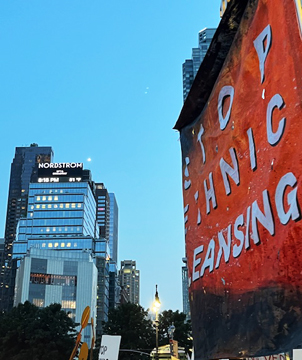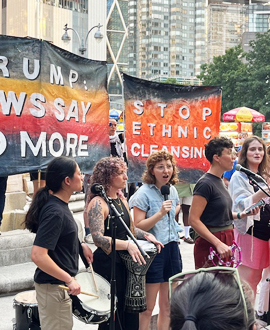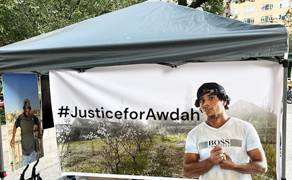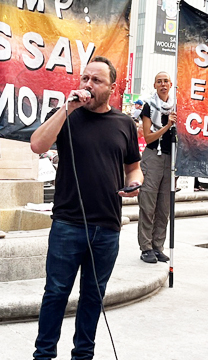American Jews Say “No More” in NYC Rally
On August 4 at 6:30 p.m. at the Maine Monument in Columbus Circle in Manhattan and steps away from the Trump International Hotel, a sea of outraged American Jews gathered to call for an end to the Israeli government’s starvation and ethnic cleansing of the residents of Gaza, and the safe entry of substantial humanitarian aid.
Arriving an hour before start time, I ran into the Multifaith Monday event, a weekly gathering under the umbrella of the Interfaith Center, which has the tagline of “Witness to Democracy.” One of their sponsors is T’ruah: The Rabbinic Call for Human Rights. Rabbi Jill Jacobs was standing nearby. I thought she might be early for the demonstration. Instead, she explained T’ruah’s role in the weekly speak-outs, underscoring the need “for a steady religious presence” in these precarious political times when it was easy to “get overwhelmed.” At the end of July, T’ruah clergy were arrested in front of the Israeli Consulate on Second Avenue. As we spoke about the disastrous events taking place in Gaza, Jacobs said, “Something cracked this week.” She was alluding to the public letter signed by over 1,000 Rabbis and Cantors from around the world, which called out the killings and starvation of the civilians of Gaza.
Other Rabbis had shown up early, and I had the opportunity to interview them.
Rabbi Abby Stein, a founding member of Rabbis for Ceasefire, voiced the importance of doubling the aid to Gaza, because “feeding people is key.” She added, “It’s basic Jewish values.” Executive Director of Partners for Progressive Israel, Rabbi Margo Hughes-Robinson, commented on the range of groups that were present. “We know the dignity and safety of Israelis and Palestinians are bound up with one another.” Hughes-Robinson saw the continuum of voices as an “inversive moment of hope.”
A long-time fixture in New York politics and former President of the human rights organization, American Jewish World Service, Ruth Messinger, told me, “I’m here because Torah states we can’t stand idly by. Starvation is not an appropriate weapon of war.” When she addressed the crowd, she shared information about MUAC, which stands for Mid-Upper Arm Circumference. “It’s the easiest way to know if a child is dying.” Messinger intoned, “Children are starving on our watch. And it’s not being addressed. We need full nutritional packages, and recipients cannot be under physical threat.” She paused and then declared, “I want you to go to bed tonight thinking about starving children in our name.”
A recurring reference of the night concerned the murder of Palestinian peace activist Awdah Hathallen by the Israeli settler Yinon Levi, known for his repeated acts of violence against Palestinians on their lands. A mourning tent had been set up for Hathallen, which is where I met Natasha Westheimer, a member of All That’s Left. She elaborated on her background and said that she had been living in Jerusalem for ten years. Westheimer is among Diaspora Jews who work directly with Palestinians. She, and others, have been calling for the body of Hathaleen to be returned to his family so he can be buried in his village of Umm al-Khair. (The Israeli government has a history of using corpses as a negotiating tactic.) A “quiet burial” was the official prerequisite, with no more than fifteen people in attendance. Currently, sixty to seventy women are on a hunger strike, demanding the return of Hathaleen’s body. Westheimer, in response to my questions, said, “State Zionism upholds Jewish supremacy and apartheid that leads to what we’re seeing for Palestinians across the Occupied Territories. As she expanded on the mindset that believes “Jews have a more valuable life” and that “Jewish statehood is of greater importance than Palestinians,” her demeanor changed. It was then that Westheimer related that she knew Hathallen personally and was “One of the many internationals that he had welcomed into his home and village.” It wasn’t another statistic. It was personal.
By 6:30, the ranks had swelled. There was a small seated area, but most people were standing, and the group had rippled out in all directions. Printed signs messaged, “Never Again is Now;” “Let Aid Into Gaza, Stop Starvation;” “Stop Ethnic Cleansing.” One button that covered all bases read, “Jews Against this Fucking Bullshit.” A woman expressed to me, “It’s hard to know how to be effective.” Yet, the signage, drummers, and button-wearers showed that their presence was a clear sign of resistance—and that in itself was a form of usefulness.
Music and chants of “Let Gaza Live” signaled the start of the program. Each speaker brought their specific energy, but the core thread was consistent. Being in community for Jewish and Palestinian equality was an antidote for feeling alone in the struggle; Jews and Americans had a responsibility to speak out. Morriah Kaplan, Interim Executive Director of IfNotNow, threw down the challenge to “any Jewish organization that doesn’t call out this moral stain.”
Brad Lander, NYC Comptroller and the mayoral candidate who had cross-endorsed Mamdani in the recent race, communicated passionately. “In New York City,” said Lander, “Muslims and Jews will not be divided. It’s not always easy, but it’s required.” He highlighted the “roiling destruction” and emphasized, “As Jews, we are required to act. One day after Tisha B’Av, we gather at a moment of profound crisis in our name.” Pointing to the failed strategy of Netanyahu, Lander insisted, “Enough!” while underscoring how the Israeli leader’s actions were not making Jews across the world safer.
You could have heard a pin drop when Palestinian photojournalist Motaz Azaiza revealed it was his “first time being surrounded by so many Jews whose intentions weren’t to harm me.” He emphasized, “Coming from Jews, it’s important. And this will reach the people of Gaza.” Azaiza told how he had been shot in the leg by the IDF, that his grandmother in Gaza was starving, and the pain of just learning that an Israeli sniper had wounded his neighbor. Azaiza stressed that the violent actions of settlers create hate. “Defending myself doesn’t mean I’m a terrorist. I want peace and justice.” He later returned to the microphone to articulate the fact that Palestinians were languishing, without due process, in Israeli prisons, and to draw attention to the numerous journalists who have been disappeared.
New York Immigration Coalition President, Murad Awawdeh, the son of Palestinian immigrants, was unequivocal in his remarks. “No more bombs, and no more turning away from parents searching for an ounce of hope or flour. Every leader who doesn’t step up has blood on their hands. We will not stop demanding justice until all the chains are broken.” Awawdek enumerated the ten stages of genocide. They sounded all too familiar, especially when he pronounced, “The world continues to look away.”
Peter Beinart and Executive Director of Jews for Racial and Economic Justice (JFREJ), Audrey Sasson, both drilled down on the common thread that Israel was starving Palestinians with impunity, all in the name of “Jewish safety.” Rabbi Jill Jacobs referenced that on the tenth day of Av, the Temple was still burning. She called out the history of the Zealots, “who pushed the people into an ill-conceived war.” Jacobs shared, “This moral voice is growing. Talmud says dying by famine is worse than dying by the sword.”
With palpable emotion, photographer and activist Gili Getz spoke on behalf of Israelis for Peace. He brought attention to the weekly Standing Together vigils in Union Square on Sundays. “Everything is interconnected,” he informed listeners. “Supremacist ideologies and a dark vision where no one is safe or free. It’s all about Bibi’s survival.” He closed with, “It’s a direct assault on Jewish values and the memory of the Holocaust.”
Congregation Beit Simchat Torah’s senior rabbi, Jason Klein, didn’t mince words. “Judaism is about the world as it could and should be. Without aboutism, speak out about starving Palestinians to death. It’s a human-made tragedy.” He implored Trump and Congress, “Stop supplying Israel with weapons. Instead, give food and medicine. Please. Let Gaza Live.”
Simone Zimmerman, co-founder of IfNotNow, was wearing an “End the Siege” shirt. She said of the ongoing murder, “It’s the same logic—the continuation of the Nakba. We must face a terrible fact. It’s too late. There are no hospitals. No universities. It’s been almost two years, and here we are.” To those gathered (almost 2,000 people), Zimmerman asked, “What challenges can you take on? What will you do to revolt? What will you do to let Gaza live?”
As the skies turned darker, it was time to march to the Trump International Hotel. It was hard to hear some of what was happening. I knew that there would be a recitation of the names of Palestinians who had either been recently killed or had died of starvation, and then a communal Mourner’s Kaddish.
I watched as several police vans pulled up and then there was a loudspeaker announcement:
“This is the New York City Police Department. You are in the roadway. If you don’t get on the sidewalk, you are subject to arrest.”
Approximately forty people were zip-tied and escorted to the waiting police vehicles. Although the procedure was orderly and peaceful, it was a disturbing sight.
As I walked to 63rd Street, the sounds of drumming and chants grew increasingly faint. When I reached Broadway, it was a completely different world. Diners were eating at cafes, couples strolled by holding hands, and people were walking their dogs. It was a strange juxtaposition between just another night on the Upper West Side and the detention of people in front of the Trump property.
Gaza was a million miles away.

To donate to Gaza hunger relief:
The New Israel Fund to Feed Gaza
IfNotNow for the Gaza Soup Kitchen
Photos: Marcia G. Yerman








Thanks, Marcia, for witnessing and putting words of this terrible moment in which Bibi and his cronies have turned Jewish history on its head, committing unbearable atrocities against Palestinians. Not in my name.